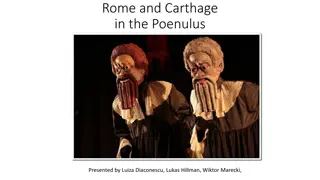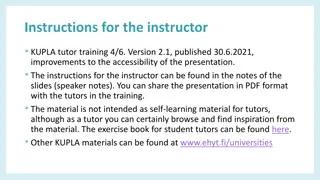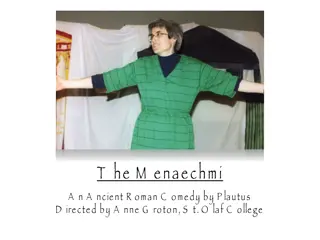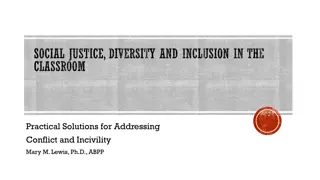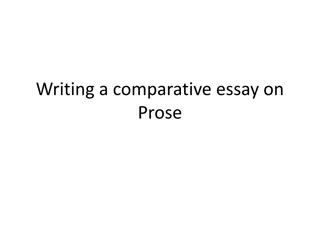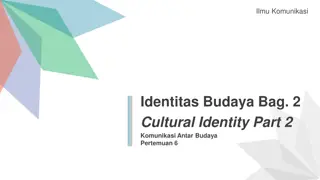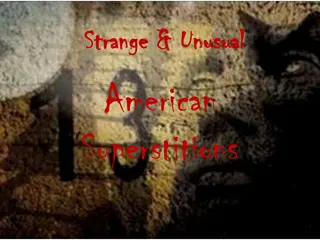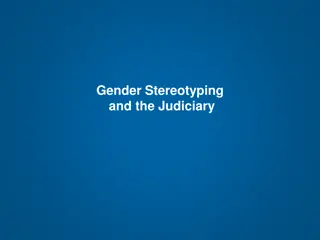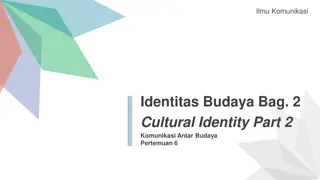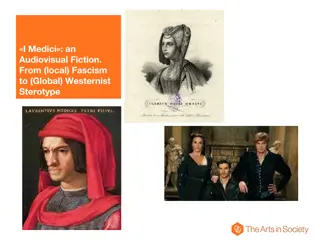Carthaginian Stereotypes in Plautus' Poenulus: A Critical Analysis
The presentation explores negative Carthaginian stereotypes portrayed in Plautus' Poenulus, focusing on themes of xenophobia and ethnocentrism. Through characters like Hanno and Pater Pius, the play reflects Rome's relationship with Carthage and exhibits Roman qualities juxtaposed with Carthaginian traits. The historical context and societal reactions add depth to the understanding of the play's messaging regarding Carthaginians.
Download Presentation

Please find below an Image/Link to download the presentation.
The content on the website is provided AS IS for your information and personal use only. It may not be sold, licensed, or shared on other websites without obtaining consent from the author. Download presentation by click this link. If you encounter any issues during the download, it is possible that the publisher has removed the file from their server.
E N D
Presentation Transcript
Carthaginian Stereotypes in Plautus Poenulus A presentation by Ludovica Montagna, Charli Kelly, Nishat Uddin and Euan Lorant
Historical Context The play was produced between 189 and 187 BCE 201 BCE end of the Hannibalic War (Second Punic War) Audience s reaction foreseen and planned: Poen. 50-1 sed nisi molestum est, nomen dare uobis uolo comoediai; sin odio est : But if you don t object, I want to give you the name of the comedy; if it does annoy you
Punica Fides: what, when and why ? Gruen s Rethinking the Other in Antiquity, 2011 From Homer to Herodotus Middle Republic to Sallust Appropriating and manipulating Carthage s image Erecting an oppositional moral model to highlight Roman integrity
Negative Carthaginian Stereotypes Plautus portrayal of his main character compels the reader to consider Rome s relationship with Carthage Powerful images of xenophobia and ethnocentrism Hanno is not an individual, but the embodiment of a stereotyped group. He appears to be an object of fun, not of sympathy. G. F. Franko The Characterisation of Hanno in Plautus Poenulus
Exploits a stereotype of Punic licentiousness (and deceitfulness) Poen.1303 sane genus hoc mulierosum est tunicis demissiciis this kind with their tunics hanging down is definitely addicted to women He can speak many languages (bilinguis) = connotations of deceitfulness and treachery Partially this trait adds to both his Punic untrustworthiness and his alleged similarity to Hannibal. E. Giusti Plautus Poenulus and the Mirror of the Enemy
Roman Qualities Displayed in a Carthaginian? Pater Pius Image 104 sed pater illarum Poenus, postquam eas perdidit, mari te<rraque> usquequaque quaeritat. ubi quamque in urbem est ingressus, ilico omnis meretrices, ubi quisque habitant, inuenit; dat aurum, ducit noctem, rogitat postibi und sit but ever since their Carthaginian father lost them, he s been looking for them everywhere by sea and by land. Whenever he enters a city, he immediately finds out where all the prostitutes live. He pays money, hires her for a night, and then asks where she s from pietas and related words used 4 times in 4 lines: 1251-56 Detailed knowledge of Roman Law
Perverse Roman Qualities Roman qualities are essentially what gets him his daughters back. Scene of the hug with his daughters - conduplicatio = embrace but used in Pseudolus as a hug of love (sexual) Plautus explicitly points to the audience the pious qualities of Hanno. Is this a joke? topsy-turvy humour of Plautus. Franko- The characterisation of Hanno in Plautus Poenulus


